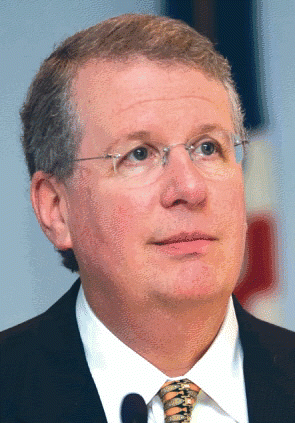Dr. Johnson noted the sobering fact that laryngeal cancer survival in the United States has decreased over the last decade, unlike survival for other forms of cancer. The expanded use of nonsurgical treatment parallels this lower survival rate, he said.
Explore This Issue
November 2009The tendency to generalize those widely reported New England Journal articles demonstrating the effectiveness of chemoradiation therapy in some circumstances potentially could have hurt a lot of people. Is this the failure to communicate effectively with our colleagues? he said. We have to avoid this tendency to generalize studies and assume that if it works in one place it’ll work somewhere else. And we need articulate leadership.
The Challenge
The challenge is to remain committed to our core values, Dr. Johnson said. Obviously that includes leadership, presentations, and publications. But the reality is that it all starts with discovery, because discovery is what allows us to take translational issues to the clinic and learn how to better care for our patients.
Prospective, multicenter trials are a must, he said. There’s every opportunity now for it to be geographically diverse-in other words, we need to work together, Dr. Johnson said. The risk if we fail is immense.
M. D. Anderson Faces the Challenge
 I’m struck after actually reviewing my own data that with so much, we don’t always do enough or do it right.
I’m struck after actually reviewing my own data that with so much, we don’t always do enough or do it right.-Randal S. Weber, MD
At M. D. Anderson Cancer Center in Houston, a team of head and neck surgeons have taken a step toward this self-evaluation, developing a system for tracking performance and quality indicators, taking heed that the emerging priorities in health care for the new millennium are safety, quality, and value.
The team defined quality of care as the degree to which health services for individuals and populations increase the likelihood of desired health outcomes and are consistent with current professional knowledge.
Their performance indicators-agreed upon and quantifiable measurements that reflect the critical success factors of an intervention-include whether a patient had to return to the operating room within seven days, deaths within 30 days of surgery, and hospital readmission within 30 days. The team examined the acuity of the procedure, the comorbid conditions of patients, and the surgeon ranking to see how much they influenced the results.
Randal S. Weber, MD, Hubert L. and Olive Stringer Distinguished Professor in Cancer Research in the Department of Head and Neck Surgery at M. D. Anderson, said the data uncovered some areas for improvement. I’m struck after actually reviewing my own data that with so much, we don’t always do enough or do it right, he said.
Leave a Reply